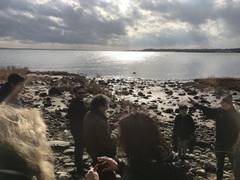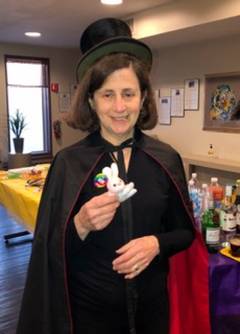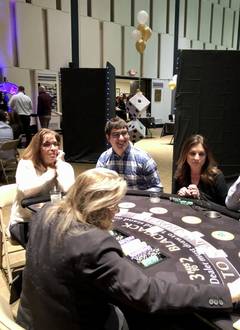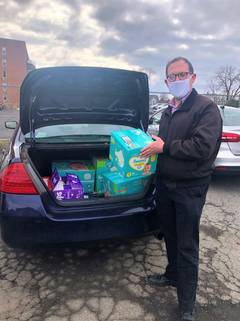Ki Tetzei 5778: Forgiveness
08/28/2018 07:26:41 PM
| Author | |
| Date Added | |
| Automatically create summary | |
| Summary |
Michael Veley is a retired corrections officer from Brush Prairie, Washington. He currently is in treatment for non-Hodgkin's lymphoma, a very serious and possibly terminal disease. Michael and his wife wanted to go on vacation to relax during the rounds of intensive treatment, and to travel together while they still could. So they booked a trip to Italy.
But on their first day in Venice, Michael suddenly found himself without his wallet. Pickpockets are common in the touristy parts of town, and Michael found himself relieved of 450 euros, his credit cards and his driver's license. Michael was understandably furious, both at the loss and the inconvenience during their special trip. He began to pray and consider what to make of his situation, realizing that he couldn't stay angry about the theft and still enjoy the rest of his vacation. So he decided to write the following note to his pickpocket:
“To the person who stole my wallet: I know you probably won't read this and I know you may not care. We arrived in your beautiful city on 14 July at 14:00 by boat #1. I became your next victim. This is my last trip with my wife. I'm dying from cancer. You left me with no money and no credit cards. Imagine for only a moment what this does to your victim. I have been praying for forgiveness. I also pray for you. Turn away from your sin which hurts innocent people. I forgive you.”
Somehow, Michael's letter got picked up and printed on the front page of one of the major Venice newspapers. Civic and business leaders reached out with offers of free hotel rooms, but Michael needed to return home for his next cancer treatment. "The memory of this trip was initially ruined, but after writing this letter the memory has now gone from anger and frustration to joy," Michael said .
We find ourselves this morning in Elul, in the season for repentance and forgiveness. Forgiveness is difficult, to say the least. If we have done wrong, it means taking responsibility for our actions and making amends. And if we have been wronged, it means deciding that whatever happened in the past does not have to dictate the future. This can be difficult even when the person who has wronged us apologizes and asks for our forgiveness. All the more so in situations like Michael's, where he will probably never meet the pickpocket. But, as Michael found, offering that forgiveness is what enabled him to make the most of his trip, even after the theft.
Our Torah reading this week, Parashat Ki Tetzei, contains many different laws. One section of it concerns various groups of people who may not enter the “assembly of God”. In ancient times, this may have functioned as some kind of general governing group of the people. The commentator Rashi notes that the practical implication of these restrictions concerns marriage. Someone forbidden from the “assembly of God” may not marry in to the Jewish people.
Within these laws, we discover a rather surprising commandment: “You shall not abhor an Egyptian, for you were a stranger in his land. Children born to them may be admitted into the congregation of the LORD in the third generation.” (Deuteronomy 23:8-9). Unlike other nations who fought against the Israelites on their way to the land, like Ammon and Moab, Egyptians are not to be totally abhorred. They are not to be regarded as such an abomination or taboo that they must be avoided at all costs. On the contrary, after living among Israelites for three generations, an Egyptian would be permitted to marry in.
This permissive attitude toward the Egyptians seems counter-intuitive. After all, the Egyptians enslaved us for hundreds of years. They threw our babies into the Nile. So committed were they to our enslavement that only after 10 horrendous plagues did they agree to let us go. And even then, they chased us through the sea when they had second thoughts.
The most natural reaction to these centuries of oppression, it would seem, would be to never have anything to do with the Egyptians ever again. And that is precisely how the Torah commands us to relate to the nations of Ammon and Moab. And yet, strangely, this is not how we are to treat the Egyptians, in spite of everything they did to us. Granted, this verse does not command that we treat the Egyptians as if nothing happened. They are not just another surrounding nation. But considering the two nations' history, the Torah does offer a relatively lenient attitude toward them. Why?
The verse itself gives us a clue: “for you were a stranger in his land.” The medieval commentator Rashi elaborates that the Egyptians were our hosts in a time of dire need. This refers back to the story of Joseph and his brothers. During the famine in the land of Canaan, the brothers and eventually the whole family found shelter in Egypt. They settled there temporarily as sojourners and had a good enough existence, until a new Pharaoh arose who did not know Joseph.
In other words, the Egyptians were not all bad. Yes, they were capable of extraordinary cruelty to us. But at other moments, they could be kind and generous. So the Torah commands some measure of kindness in return.
An ancient commentary (Mekhilta d'Rabbi Yishmael 13:17) goes even further. Although Pharaoh initially refused to release the people Israel, eventually he changed his mind and did so. Yes, he was under no small amount of coercion. But eventually he did the right thing. He was capable of change, which is no small matter. It doesn't justify the centuries of slavery. But it does mean that under certain circumstances the Israelites could have a relationship with individual Egyptians.
Finally, Rabbi Jonathan Sacks suggests that this commandment has nothing to do with how the Egyptians behaved, but rather, what the Jews needed. “If the people continued to hate their erstwhile oppressors,” Rabbi Sacks writes, “Moses would have taken the Israelites out of Egypt, but would have failed to take Egypt out of the Israelites... They would be slaves to the past, held captive by the chains of resentment, unable to build the future. To be free, you have to let go of hate. ”
This seems to be the lesson that Michael Veley learned in Venice. He could have been angry about the whole incident and let it ruin what was supposed to be an important moment in his life. From the perspective of Jewish law, he was under no obligation to forgive the unrepentant pickpocket. Nevertheless, he chose to forgive, he chose to liberate himself emotionally. He was able to regain control over the situation by letting go of the past.
Of course, this kind of forgiveness doesn't excuse what Michael's pickpocket or the ancient Egyptians did. They still are responsible for their crimes. But forgiveness and mercy allow the victims to not be defined by their victimization. They will not let what happened to them in the past determine their future.
Yes, this is difficult. But there's a reason that they are called the High Holidays. They are a season that calls on us to reach for our higher selves, for the people we know we can become if we really work at it. Another ancient midrash (Devarim Rabbah 5:15) suggests that this kind of forgiveness is more Divine than human. Left to our own devices, we mortals can be petty and stubborn. We can hold on to grudges long after they have outlived their usefulness. Indeed, this same passage in the Torah requires us to abhor, to have nothing to do with, the nations of Ammon and Moab, who never acted with hospitality towards us or changed their behavior the way the Egyptians did.
But the Torah commands that we show the Divine quality mercy towards the Egyptians. We must try to find a way, however small, to imitate God by pursuing peace specifically when we are not inclined to do so. Our relationship with the Egyptians is full of pain, but it also has the potential to be repaired.
By extension, with God's help and encouragement, we can do the same with others who have hurt us in the past. There are situations when a relationship is beyond repair. But there are also relationships that are strained, but can be repaired through a willingness to overcome the past. Following the path of the commentaries I discussed earlier, when someone has wronged us, we can look for the good things they may have also done. We can look for the ways they have shown to be capable of change and growth.
These good things don't excuse the bad. Nor am I suggesting that we simply forgive and forget as if nothing happened. But if the Torah and its commentaries can find reasons to re-engage with the Egyptians, of all people, we can find reasons to restart or repair our relationships with those who have wronged us.
The Days of Awe approach. Each day of Elul, the echoes of the shofar resound louder and louder. We each face a choice. We can hold on to our victimization and become defined by the worst things that have ever happened to us. Or, we can try to find a way out. We can look for the good even in those who have hurt us, and do our part to repair strained or broken relationships. May the Holy Blessed One grant us the strength this Elul to do so.
Sun, November 9 2025
18 Cheshvan 5786
Photo Gallery
Photo Albums
Upcoming Events
-
Friday ,
NovNovember 14 , 2025Give Thanks at Tot Shabbat 2025
Friday, Nov 14th 5:30p to 6:30p
-
Tuesday ,
NovNovember 18 , 2025Women's Rosh Chodesh Group
Tuesday, Nov 18th 12:00p to 1:30p
New Women's Rosh Chodesh Group Tuesdays, 12:00-1:30pm Gather with Cantor Sklar and KTI friends at the start of each month of the Hebrew calendar to learn about the themes and traditions of the coming month. Learn from each other, learn more about each other and better understand the women within our tradition. Enjoy music and lunch together! Please a dairy or parve lunch to enjoy at noon, followed by the discussion at 12:30pm. KTI will provide drinks and dessert. RSVP Appreciated -
Wednesday ,
NovNovember 19 , 2025Rabbi, May I? Modern Responsa
Wednesday, Nov 19th 10:00a to 11:30a
Wednesdays, 10 - 11:30 AM, KTI Library Ever since Abraham’s famous argument with God, Judaism has been full of debate. Moses and Korah, David and Nathan, Hillel and Shammai, the Vilna Gaon and the Ba’al Shem Tov, Spinoza and the Amsterdam Rabbis . . . the list goes on. No wonder that Judaism cherishes the expression machloket l’shem shamayim, “an argument for the sake of heaven.” Beyond their historical importance, what makes these disputations so compelling is that nearly all of them, regardless of their epochs, are still being argued. The parade of characters spanning three millennia of biblical, rabbinic, and modern disputation reflects the panorama of Jewish history with its monumental political, ethical, and spiritual challenges. This series will examine Jewish responses to exile from the biblical period to our modern day. Considering texts from all genres of Jewish literary creativity, we will explore how the realities and iterpretaions Join as we re-open these timeless debates that lead us to the core of 3,000 years of Jewish conversation. • Justice: Abraham vs. God (October 19) • Holiness and Authority: Moses vs. Korah (November 9) • Inclusion: The Five Daughters vs. the Twelve Tribes (November 30) • Accountability and Morality: David vs. Nathan (December 21) • Resistance: Ben Zakkai vs. the Zealots (January 18) • Law: Hillel vs. Shammai (February 15) • Spirituality: The Vilna Gaon vs. the Baal Shem Tov (March 15) • Boundaries: Spinoza vs. the Amsterdam Rabbis (April 19) • Religious Evolution: Geiger vs. Hirsch vs. Frankel (May 10) • Zionism: Herzl vs. Wise (May 31) -
Wednesday ,
NovNovember 19 , 2025Wrestling with God
Wednesday, Nov 19th 8:00p to 9:30p
Wrestling with God Wednesdays, 8-9:30 PM Congregants’ homes TBA We need to talk about God. And about how we talk, and don’t talk, about God. It’s a big topic, maybe the biggest. This offering invites adult learners into compassionate inquiry, deepening their relationship to Jewish text through collective exploration. Using the album s*ngs ab-ut g?d [https://open.spotify.com/album/6JEY2AN6awAxNfWwmXX460] by Jewish educator Eliana Light as a starting point, this series blends music, Hebrew text study, and open-ended questions to help participants examine their own connections to the divine. This is sacred work. It’s not about getting it right. It’s about showing up with curiosity, humility, and a willingness to join the long lineage of Jews who wrestle with God. Each session stands alone, but we’d love to have a consistent group as much as possible. Dates: September 10: skyman October 22: shadows November 19: in the silence December 10: if only January 21: lead me back February 11: three steps March 11: beyONEd April 29: the mountains May 20: the name June 17: I rise -
Thursday ,
NovNovember 20 , 2025Coffee with the Rabbi
Thursday, Nov 20th 8:00a to 9:00a
Start your morning with some caffeine and casual or meaningful conversation! Join Rabbi Goldberg for a Coffee Chat! Stop by Rye Ridge Starbucks any of the following Thursdays, between 8-9am: June 12 and 26 July 10 and 24 August 7 and 21 September 4 and 18 October 16 and 30 November 6 and 20 December 4 and 18
Privacy Settings | Privacy Policy | Member Terms
©2025 All rights reserved. Find out more about ShulCloud






